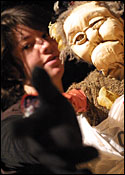On campus
Puppets take the stage
Puppets can seem creepy.
 The Puppet Project's Emily DeCola and Streetcomber
The Puppet Project's Emily DeCola and StreetcomberPHOTO: Owen Egan |
|
They are lifeless objects, yet, with a touch of imagination, they become sentient with their own thoughts and feelings, propelled by more than mechanical manipulation.
Emily DeCola, a sculptor and recent McGill graduate from anthropology and theatre studies, has thought a lot about puppets. "I looked at the roles of puppetry and mythmaking in different cultures.
"Puppets provoke people to look at art objects in a way that trangresses boundaries. They're constantly dying and coming alive. They stop moving, then move again. We ascribe life and initiative to what was an object."
DeCola, Clea Minaker and Angie Orrego make up the Puppet Project, a theatre troupe that specializes in you-know-what. The Puppet Project's production The Memory Tree will soon be presented at McGill.
The story is about the elderly Keesh, a man who has discarded his memories of his dead wife, yet is fascinated with funerals. His wife had tended the memory tree, now dying of neglect; their daughter Penelopeep doesn't know she is next in line to care for it.
Other main characters include a funeral director who can fly, a Boba Fett/Medusa-like psychic, Fluffy Magoo the coppery cat, and Streetcomber, an old woman who collects whatever little object is in her path, thus holding on to other's memories. Also featured are swarms of glittery bugs, a fuzzy, hot pink, multi-legged creature, a love story, businessmen and boudoirs.
The Memory Tree, February 6-9 and 13-16, 8 pm in Tuesday Night Café Theatre, Morrice Hall, 3485 McTavish St. $6/$8, call 398-6600 for info and to reserve. Live music provided by the Bell Orchestre.
Feared and revered
 Environmental activist Wangari Maathai (foreground)
Environmental activist Wangari Maathai (foreground) |
|
In the mid-'70s, when women in Kenya said they had no firewood, Wangari Maathai listened. And then she started one of the world's most successful environmental movements.
The shortage of firewood was a direct consequence of a shortage of trees. The loss of trees was the result of widespread environmental degradation.
Maathai, a veterinary anatomy professor at the University of Nairobi and a prominent activist in the National Council of Women of Kenya, proposed taking action. She urged Kenyan women to make concrete contributions to improving their country. She asked them to plant trees.
They did. By the end of 1993, they had planted over 20 million trees. Known as the Green Belt Movement, Maathai's brainchild has sparked similar initiatives in other African countries. In Kenya, the Green Belt Movement has evolved and taken on new activities -- promoting and protecting biodiversity, creating thousands of greenhouses and training people in how to improve the quality and quantity of their agricultural produce.
Maathai's efforts have earned her the Right Livelihood Award (widely known as the "Alternative Nobel Prize"). They have also earned her the enmity of the Kenyan government.
Her scathing criticisms of government policies have resulted in Maathai being officially labelled a "subversive." She has been arrested and physically attacked and when she ran for the Kenyan presidency, was the victim of a "dirty tricks" campaign -- a false but widespread rumour that she had pulled out of the race led to her receiving few votes.
Maathai will soon be at McGill, courtesy of the Beatty Memorial Lectures Series. Her presentation, "Standing up for the Environment," will take place on February 12 at 6 pm, in the Leacock Building's Fieldhouse Auditorium.
Ladies who lunch
 The McGill Women's Networking Group discusses future events
The McGill Women's Networking Group discusses future eventsPHOTO: Owen Egan |
|
They owe it all to the employment equity study of 1990, when Honora Shaughnessy, then McGill's equity coordinator, started up the McGill Women's Networking Group (MWNG) to look at the issues related to McGill women in the workplace.
Kim Bartlett, MWNG steering committee member, says, "When the excitement died down, the group wondered if there were other issues of interest to women in the University."
And so this group, open to all women at McGill -- academic, staff, students (usually mature or graduate) -- continued to "offer a time and space for women to get together," says Kathy Mayhew, also of the steering committee.
"Women strive to balance work with family and a personal life," Bartlett says. And many of the MWNG events reflect this common struggle.
Jill Barker, fitness doyenne, recently gave a talk on exercise goals and realities. Lunchtime seminars take place the third Wednesday of every month. On February 20, John Archer will speak on "Retirement Income Options."
Events are relaxed and informative, be they lectures on estate planning, stress management or nutrition. In the past they've met at the Beer Museum, Robert & Cie for jazz, and in the Faculty Club's Maude Abbott room. They've held wine tastings, a sushi-making workshop, and golf clinics. Every December they raise money at a holiday pot-luck lunch for Auberge Transition, a women's shelter.
"It's a great opportunity to meet people beyond your immediate office," says Bartlett. "You mingle with people from different levels, other areas, who do different things from you." And by meeting women from other parts of the University, you have personal contacts to turn to when a work-related question arises.
Health care under pressure
Canada's public health care system hits 30 this year and, according to the country's premiers, it's in a state of crisis.
The McGill Institute for the Study of Canada will be taking health care's pulse at its seventh annual conference, "Diagnostics & Solutions: Building Consensus for Health Care Reform."
Professor Antonia Maioni, director of MISC, says, "We pick topics that are timely and of interest to a pan-Canadian audience." In the past, MISC conferences have tackled such subjects as citizenship, the teaching of history and NAFTA. "MISC conferences are known for providing an open and neutral ground for controversial topics."
Are the premiers right? Is the system about to go off the rails unless it's dramatically overhauled? Policy makers, practitioners and researchers will be on hand at the conference to deal with this thorny question.
"We need a reality check. What is the real state of health care in Canada? Let's get all the facts on the table," Maioni says. Among the presenters at the conference will be Anne McLellan, the new federal minister of health, and Roy Romanow, the chair of the Royal Commission on the Future of Health Care in Canada.
"We want to engage the stake-holders in the debate," says Maioni. "What should be in the basket of medicare options? What should hospitals provide? Why are we talking about privatization? Indeed, what is privatization? We should define it."
The conference takes place February 14-16. For more information, call Lynne Darroch, 398-2658, or Johanne Bilodeau, 398-2605. www.arts.mcgill.ca/programs/misc/health.htm

